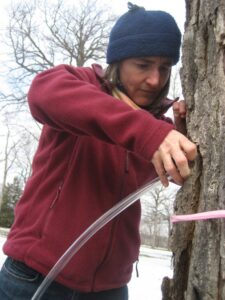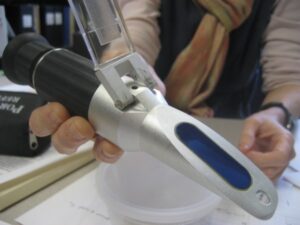This week students in Dr. Amy Verhoeven’s Plant Physiology lab are in for a real treat, literally.
The 12 students, all biology or biochemistry majors, are getting a hands-on lesson in water transport and sugar transport in maple trees, which will culminate in their own homemade maple syrup.
“The process of sap flow in maples (during tapping season mid-March through mid-April) is different from their water movements and sugar movements during the rest of the year. This is what we’ll be studying,” Verhoeven said. The class also will learn how to identify various kinds of maples in winter, which is difficult because they’ve lost their leaves.

Dr. Amy Verhoeven checks on a maple tree she tapped March 16, near Brady Hall, in preparation for today's lab.
Earlier this semester University of St. Thomas greenhouse manager Steve Trost’s brother-in-law, a forester, walked the campus with Verhoeven and helped her identify the four kinds of maples – silver, sugar, boxelder and Norway – that her students would use in their research.
The lab project began yesterday afternoon, when the class tapped, or drilled one- to two-inch-deep holes, into each of the four trees, all located on St. Thomas’ south campus near Loras Hall. Afterward they inserted steel spigots, with plastic tubing fastened to the spouts, into the holes. The sap will slowly drain down the tubing, drop by drop, collecting in covered, five-gallon buckets perched at the base of each tree.
The students will collect sap samples from each of the four trees over the course of this week and next Monday during the lecture portion of class, held Mondays, Wednesday and Fridays. During their lab section next Monday afternoon they will test the sugar content in each sample using a refractometer, a tool that measures how the sugar in the sap refracts, or bends, light.
“Light moves in waves, and if it hits water, it bends. But if you have sugar in it, it bends more,” Verhoeven explained. They’ll also do some testing while the sap boils down to syrup.
Early next Monday before class, Verhoeven and Trost will carry the buckets of sap to the Owens Science Hall greenhouse and begin the hourslong boiling-down process (outdoors on Verhoeven’s Coleman camping stove) by which the sap − clear, runny and barely sweet − will be reduced to sweet, sticky, amber syrup and poured over Eggo waffles, compliments of Verhoeven.
Verhoeven is happy to enlighten her students’ taste buds in addition to their minds, as she was surprised to discover that most of her class had never tasted real maple syrup. “They’re really excited about it,” she said.
In fact, two weeks ago Verhoeven and Trost tapped two trees along Goodrich Avenue in back of Brady Hall as tests for her students' lab this week. She wanted to be sure she had maple syrup on tap for them in case the weather didn't cooperate with her plans for the lab. As good fortune would have it, the pair collected roughly 15 gallons of sap since March 16, which Verhoeven reduced to "about 10 cups of gorgeous looking syrup" at her home this past weekend.
This semester the class has had a biofuels theme. “The maple syrup labs are not a part of that theme obviously,” Verhoeven said. “They are fun labs that will help reinforce some of the basic plant transport concepts that we are studying.”

Students will use a refractometer (shown here) to test the sugar content of the sap they collect this week.
"The students have been reading papers about biofuels and researching different crops that are being pursued as potential biofuel crops," Verhoeven explained. They also have been studying the fundamentals of plant physiology, such as photosynthesis, water relations, nutrient requirements and plants’ responses to the environment, three days a week (Mondays, Wednesdays and Fridays) during the one-hour lecture portions of the class.
The three-hour lab section of the course is held once a week following Monday's lecture. "In addition (to the maple tree lab project), we're going to grow algae and design experiments to try and optimize algal growth as a potential source of biofuels," Verhoeven said.






